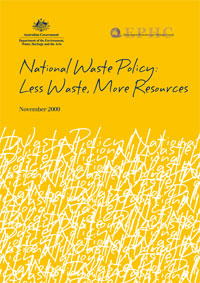National Environment Protection Council
National Waste Policy: Less Waste, More Resources
Department of the Environment, Water, Heritage and the Arts

The National Waste Policy sets a clear direction for Australia for the next 10 years and will update and integrate Australia’s policy and regulatory framework. It will build on existing settings by providing a nationally agreed direction and focus that will be implemented by individual jurisdictions within their borders and collective action by the Commonwealth and state and territory governments. The policy encompasses wastes, including hazardous wastes and substances, in the municipal, commercial and industrial, construction and demolition waste streams and covers liquid, gaseous and solid wastes. Radioactive waste is excluded.
The policy sets directions in six key areas and identifies 16 strategies across these areas. The strategies are designed to:
- provide a coherent, comprehensive national framework for waste management, resource recovery and the avoidance of waste over the next decade
- enable Australia to meet its international obligations in regard to the management of hazardous wastes and substances and persistent organic pollutants into the future and reduce the risk and legacy for future generations
- address market impediments and streamline the regulatory frameworks so that national companies and small businesses can operate effectively and efficiently and manage products and materials responsibly during and at end of life
- provide national leadership on waste and resource recovery where it is needed and facilitate collaboration between the states on national issues.
- contribute to climate change, sustainability, innovation and employment opportunities, and
- be high impact and cost effective by setting clear national directions and through collaborative, carefully targeted action that incrementally builds on the existing efforts of governments over a ten year period.
The National Waste Policy was finalised following the release of a discussion paper and a subsequent consultation program earlier in 2009. EPHC endorsed the National Waste Policy on 5 November 2009.